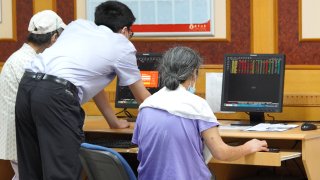
- The Japanese government is set to extend the state of emergency covering Tokyo and other regions till March 7 in order to contain the coronavirus, local media reported.
- The Reserve Bank of Australia on Tuesday announced its decision to maintain its cash rate at 0.1%.
- On the trade front, the UK government recently announced that it had applied to join the Asia-Pacific trade bloc, formally known as the Comprehensive and Progressive Trans-Pacific Partnership.
SINGAPORE — Stocks in Asia-Pacific rose on Tuesday following an overnight jump on Wall Street.
The Shenzhen component in mainland China saw robust gains as it rose 2.073% on the day to 15,335.66. The Shanghai composite advanced 0.81% to 3,533.68. Hong Kong's Hang Seng index was 1.15% higher, as of its final hour of trading.
The Taiex in Taiwan also saw strong gains as it rose 2.27% to close at 15,760.05.
South Korea's Kospi jumped 1.32% to end its trading day at 3,096.81.
India's Nifty 50 jumped 2.4% while the BSE Sensex also surged about 2%, as of around 1:10 p.m. local time. That came after India's finance minister on Monday presented the country's budget for the fiscal year that begins April 1 and ends March 31, 2022.
In Japan, the Nikkei 225 gained 0.97% to close at 28,362.17 while the Topix index advanced 0.94% to finish its trading day at 1,847.02.
Money Report
The Japanese government is set to extend the state of emergency covering Tokyo and other regions till March 7 in order to contain the coronavirus, local media reported.
Over in Australia, the S&P/ASX 200 closed 1.49% higher at 6,762.60.
MSCI's broadest index of Asia-Pacific shares outside Japan rose 1.33%.
RBA keeps cash rate steady
The Reserve Bank of Australia (RBA) on Tuesday announced its decision to maintain its cash rate at 0.1% as well as purchase an additional 100 billion Australian dollars of bonds (approx. $76.32 billion).
In a statement, RBA Governor Philip Lowe said: The Board will not increase the cash rate until actual inflation is sustainably within the 2 to 3 per cent target range."
"For this to occur, wages growth will have to be materially higher than it is currently. This will require significant gains in employment and a return to a tight labour market," Lowe said. "The Board does not expect these conditions to be met until 2024 at the earliest."
Following that announcement, the Australian dollar changed hands at $0.7606, after seeing an earlier high of $0.7661.
UK looks to join TPP
On the trade front, the UK government recently announced that it had applied to join the Asia-Pacific trade bloc, formally known as the Comprehensive and Progressive Trans-Pacific Partnership.
A British cabinet minister said on Monday it would be a "win-win" for the UK and its trade partners in Asia if the country joins the trade pact, NHK reported.
"Applying to be the first new country to join the CPTPP demonstrates our ambition to do business on the best terms with our friends and partners all over the world and be an enthusiastic champion of global free trade," British Prime Minister Boris Johnson said in a press release.
Overnight stateside, the Dow Jones Industrial Average rose 229.29 points to close at 30,211.91. The S&P 500 gained 1.6% to end its trading day at 3,773.86 while the Nasdaq Composite surged 2.6% to close at 13,403.39.
Currencies and oil
The U.S. dollar index, which tracks the greenback against a basket of its peers, was at 90.964 after rising earlier from levels below 90.6.
The Japanese yen traded at 105 per dollar, weaker than levels below 104 against the greenback seen last week.
Oil prices were higher in the afternoon of Asia trading hours, with international benchmark Brent crude futures up 0.87% to $56.84 per barrel. U.S. crude futures advanced 1.03% to $54.10 per barrel.
Subscribe to CNBC PRO for exclusive insights and analysis, and live business day programming from around the world.






